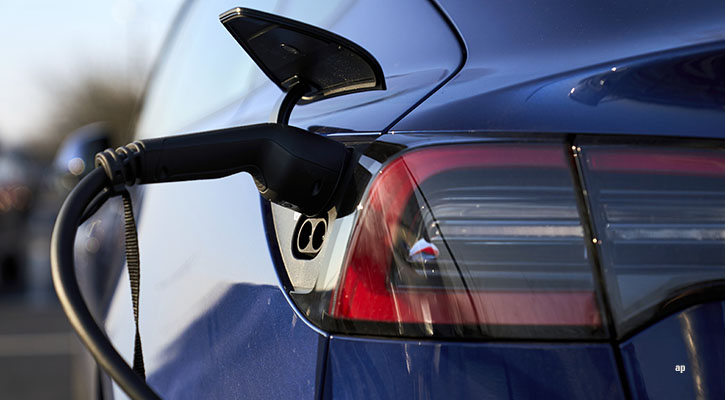(Alliance News) - London's FTSE 100 is called to open a touch higher on Monday, while stocks in Asia traded more confidently, on decent data out of China.
SPI Asset Management analyst Stephen Innes commented: "Asia's markets are riding a wave of optimism, catching a significant tailwind from Wall Street's record-setting day on Friday and buoyed further by emerging signs that China's economic funk might be easing. Recent data, including the latest purchasing managers' index figures, suggest that the world's second-largest economy might be rounding a corner after a protracted slowdown. The not-so-secret sauce is a series of support measures introduced at the end of September that triggered a much-needed multiplier effect."
Chinese manufacturing activity accelerated at the fastest rate since June in November, S&P Global data showed Monday.
The headline seasonally adjusted purchasing managers' index improved to 51.5 in November from 50.3 it October.
Growing further beyond the neutral 50-points mark separating growth from contraction, it indicates the pace of growth sped up. It was the fastest rate of growth since June.
The mood in Europe, meanwhile, is less rosy.
Swissquote analyst Ipek Ozkardeskaya commented: "December doesn't arrive with chocolate and flowers to Europe. First, Stellantis CEO resigns on weaker sales and tumbling profits. Second, VW workers are expected to walk out as early as today, because their labour leaders couldn't reach an agreement on how to reduce costs to prevent factory closures. Sadly for VW, the worker walkouts may only get the matters worse when there is no money flowing in to make everyone happy. And finally, the French political scene remains messy."
Focus later this week will be on the US jobs market, where there is a number of readings culminating with Friday's nonfarm payrolls.
Here is what you need to know at the London market open:
----------
MARKETS
----------
FTSE 100: called up just 1.9 points, largely flat, at 8,289.20
----------
Hang Seng: up 0.7% at 19,565.69
Nikkei 225: up 0.8% at 38,513.02
S&P/ASX 200: up 0.1% at 8,447.90
----------
DJIA: closed up 188.59 points, 0.4%, at 44,910.65
S&P 500: closed up 0.6% at 6,032.38
Nasdaq Composite: closed up 0.8% at 19,218.17
----------
EUR: down at USD1.0519 (USD1.0579)
GBP: down at USD1.2693 (USD1.2697)
USD: down at JPY150.14 (JPY150.43)
GOLD: lower at USD2,631.65 per ounce (USD2,660.13)
(Brent): lower at USD72.43 a barrel (USD72.65)
(changes since previous London equities close)
----------
ECONOMICS
----------
Monday's key economic events still to come:
09:00 GMT eurozone manufacturing PMI
10:00 GMT eurozone unemployment
11:00 GMT Ireland GDP
09:30 GMT UK manufacturing PMI
14:45 GMT US manufacturing PMI
15:00 GMT US ISM manufacturing PMI
----------
UK house price growth accelerated markedly last month, numbers from mortgage lender Nationwide showed. House prices surged 3.7% on-year in November, the fastest pace of annual growth in two years, picking up speed from a 2.4% rise in October. Prices rose 1.2% in November from October. They had edged up 0.1% in October from September. The average UK house price now sits at GBP268,144, according to Nationwide. "The acceleration in house price growth is surprising, since affordability remains stretched by historic standards, with house prices still high relative to average incomes and interest rates well above pre-Covid levels," Nationwide analyst Robert Gardner commented. "The pickup in price growth is unlikely to have been driven by upcoming stamp duty changes, since the majority of mortgage applications commenced before the budget announcement. Housing market activity has remained relatively resilient in recent months, with the number of mortgage approvals approaching the levels seen pre-pandemic, despite the higher interest rate environment." From the end of March, the temporary increase in the nil rate stamp duty thresholds will end. For first-time buyers of a home under GBP500,000, the nil rate band falls to GBP300,000 from GBP425,000 currently. For other home buyers, the nil rate band threshold is to decline to GBP125,000, from GBP250,000.
----------
UK Prime Minister Keir Starmer will set out a "plan for change" with milestones set in key policy areas to achieve the targets laid out in Labour's manifesto, Downing Street has said. Starmer will this week kick off what he has called the "next phase" of government, as he announces the markers for his "missions" that Number 10 say will allow the public to hold Starmer and his team to account on their promises and will be reached by the end of the Parliament. The milestones will run alongside public sector reform, Downing Street said. This will include a focus on reforming Whitehall, spearheaded by the as-yet-unannounced new chief civil servant the Cabinet Secretary and Cabinet ministers, so it is geared towards the delivery of Labour's missions, according to Number 10. The same focus will also influence decisions for next year's spending review, it has been suggested. Writing in The Sun on Sunday, the prime minister said that "acceptance of managed decline" has "seeped into parts of Whitehall". "The British people aren't fools. They know a ruthless focus on priorities is essential," he wrote. The Sunday Times reported that one of the milestones would focus on early education, with the aim to raise the number of children who are ready for school, educationally and socially.
----------
UK defence firms will be prioritised for government money under a new strategy due to be announced on Monday. Defence Secretary John Healey will launch the defence industrial strategy and pledge to increase jobs in the sector across the UK. Investors and trade unions will be among those invited to offer views on the sector, with a statement of intent for the strategy expected on Monday morning.
Officials are also exploring how to make the defence supply chain more resilient, with the industry due to take part in a "war game" exercise which will test how firms and the Ministry of Defence could maintain supplies to the front line if they were faced with fighting and supply chain disruption. Healey is expected to discuss the strategy when he speaks at a London Defence Conference event on Monday.
This will be the first defence industrial strategy since Russia invaded Ukraine, with the last version published in 2021, and it is expected to be published in the first half of 2025, with consultation open until the end of February. Defence Secretary John Healey said: "Our defence sector should be an engine for jobs and growth, strengthening our security and economy. That requires a defence industry that is better and more integrated – one that can keep our armed forces equipped, innovating at a wartime pace, and ahead of our adversaries. We will develop this new defence industrial strategy with industry, with innovators and with workers. We will mobilise the private sector to help face down global threats, direct more public investment to British businesses and create jobs and growth in every nation and region of the UK."
----------
Micheal Martin has insisted it is time to "get on with the work" after hailing his Fianna Fail party's performance in Ireland's general election. Fianna Fail is on course to secure the most seats in the Dail parliament, with party leader Martin poised for another stint in the role of taoiseach. As the arduous count process enters its third day on Monday, with more than three quarters of the Dail parliament's 174 seats filled, the return of an administration involving Fianna Fail and Fine Gael now looks a much more likely prospect than any government including the long-time main opposition party, Sinn Fein.
The two centrist parties that have dominated Irish politics for a century, and who shared power in the last coalition, both ruled out governing with Sinn Fein before Friday's election, so it seems unlikely that either would countenance that option if they could form a workable coalition together. If it is to be a reprise of the Fianna Fail/Fine Gael governing partnership of the last mandate, one of the major unanswered questions is around the position of taoiseach, and whether the parties will once again take turns to hold the Irish premiership during the lifetime of the new government. The outcome in 2020 saw the parties enter a coalition on the basis that the holder of the premier position would be exchanged midway through the term. Martin took the role for the first half of the mandate, with Leo Varadkar taking over in December 2022. Current Fine Gael leader Simon Harris succeeded Varadkar as taoiseach when he resigned from the role earlier this year. However, this time Fianna Fail appears well placed to increase its seat lead over Fine Gael, compared with the last election when the parties were much closer.
----------
BROKER RATING CHANGES
----------
RBC cuts Vistry to 'underperform' (sector perform) - price target 500 (825) pence
----------
RBC raises Barratt Redrow to 'outperform' (sector perform) - price target 575 pence
----------
COMPANIES - FTSE 100
----------
HSBC Holdings is preparing to start the search for its next chair, Sky News reported on Saturday. "City sources" told Sky that the lender's board has appointed headhunters to recruit a successor to current Chair Mark Tucker. Tucker is expected to step down in the spring of 2026, at around the same time as HSBC's annual general meeting, having served as chair since 2017. "Executives said on Saturday, however, that he could leave earlier depending upon the pace of the process," Sky said. The search for Tucker's successor is being coordinated at the board level by Senior Independent Non-Executive Director Ann Godbehere.
----------
COMPANIES - FTSE 250
----------
International Public Partnerships said it "continued to perform well" since the half-year end as "demand for infrastructure investment remains strong". The infrastructure investor confirmed its 2024 dividend target of 8.37 pence per share, which would represent growth of 3.0% from 2023. Chair Mike Gerrard said: "INPP's portfolio has continued to perform well during the period, generating consistent financial returns whilst facilitating the delivery of essential public services. We continue to make progress with our initiatives to optimise the portfolio, address the discount to net asset value at which the company's shares currently trade, and deliver value to shareholders." INPP's NAV per share at the June 30 half-year end stood at 149.5p. Recent developments in bond markets, foreign exchange and inflation rates are expected to "have a modest negative impact" on its NAV, however. Inflation rates in the areas it operates in are "slightly below" forecasts. INPP said a stronger sterling will also have a "minor negative impact". The firm added: "Yields on the government bonds issued by the countries in which the company is invested are broadly in line with the levels seen at 30 June 2024 with the exception of the yields on UK government bonds which have increased slightly. In isolation, this would imply a modest negative impact on the valuation of UK investments, but it is worth noting that the discount rates that will be adopted as part of the 31 December 2024 valuation will be determined by taking into account other factors such as the positive performance of the investments and market-based evidence of pricing for infrastructure assets and businesses." From next year, it will pay dividends on a quarterly basis, and not semi-annually. Gerrard added: "The company has also continued to buyback shares under the previously announced share buyback programme of up to GBP60 million. We remain confident in the company's ability to navigate macroeconomic uncertainties, underpinned by the performance of its investment portfolio." Looking ahead, INPP said "demand for infrastructure investment remains strong across the geographies in which the company invests". It added: "The company recognises that the recent policy shifts in the UK autumn budget, particularly in relation to schools, healthcare facilities and transport networks, will seek to deliver greater social equality in the UK and will aid sustainable social infrastructure development for the benefit of local communities. There is significant government appetite for private capital investment to support infrastructure policy, which creates attractive opportunity for INPP and its shareholders."
----------
OTHER COMPANIES
----------
Gamma Communications said it has kicked off the "workstreams" needed for a move to the Main Market of the London Stock Exchange. The provider of communication services in UK, German, Spanish and Dutch business markets is currently listed on the AIM junior market but in September announced it was "beginning to consider a move to the Main Market". It said at the time that it would provide a "further update in January 2025 following engagement with our largest shareholders". Gamma is eyeing a equity shares (commercial companies) listing category on the Main Market. It added: "The Company is in the process of appointing advisers and, subject to FCA approval, expects to move to the Main Market in mid-2025. The company will provide further updates as specific timeframes are confirmed. The board believes that a move to the Main Market will serve to further enhance the company's reputation and support market penetration as Gamma continues to grow in different jurisdictions."
----------
boohoo said it has repaid a chunk of term loan, after concluding a placing. The online fashion retailer repaid GBP50 million of a GBP97 million loan. "The repayment will be made with funds raised from the placing and through the group's initiative to reduce stock levels as we become a leaner and lighter business, focused on maximising value for all our shareholders. The board would like to thank our banking syndicate for their continued support," Chief Executive Officer Dan Finley said. The Manchester-based owner of PrettyLittleThing, Karen Millen and Debenhams, last month raised around GBP39 million through an oversubscribed share placing and subscription.
----------
Philippines-focused mineral resources firm Metals Exploration said it is sizing up a takeover offer for fellow London listing Condor Gold. Metals Exploration said it is "in advanced-stage discussions" with the board of Condor, the company developing the La India gold project in Nicaragua. Metals owns the Runruno gold asset in the Northern Philippines. "There can be no certainty that any firm offer will ultimately be made, nor as to the terms on which any offer might be made," Metals added. In a statement from Sunday, Condor said it received two non-binding offers, one from Metals and another from Toronto-listed Calibre Mining. The terms of either offer were not disclosed. Calibre on Monday, however, said it does not plan to make an offer for Condor. "Condor initiated the sale process for their La India gold asset two years ago. During this time, Calibre acknowledges having engaged in discussions with Condor regarding the potential acquisition of the La India gold asset, which aligns well within Calibre's Hub & Spoke operation. However, Calibre confirms that it is not currently in discussions with Condor, nor does it have an active offer," it explained. Sky News on Sunday said the Metals Exploration tilt is a cash and shares swoop, and would create an enlarged firm worth about GBP150 million. Condor has a market capitalisation of GBP47.0 million, while Metals is worth GBP99.0 million. Metals on Monday announced it entered into an unsecured bridging term loan facility worth GBP5.5 million Drachs Investments No 3 Ltd. The financing is in connection with its possible Condor buy. It carries a 10% annual interest rate. Metals noted Drachs owns just over 18% of its shares.
----------
By Eric Cunha, Alliance News news editor
Comments and questions to newsroom@alliancenews.com
Copyright 2024 Alliance News Ltd. All Rights Reserved.













.jpg)


















